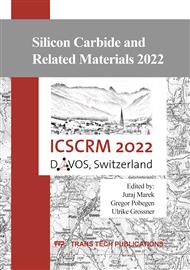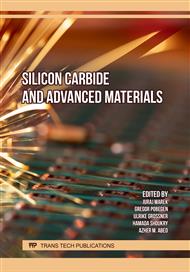[1]
K. S. Novoselov, A. K. Geim, S. V. Morozov, D. Jiang, Y. Zhang, S. V. Dubonos, I. V. Grigorieva, A. A. Firsov, Electric field effect in atomically thin carbon films, Science. 306 (2004) 666-669.
DOI: 10.1126/science.1102896
Google Scholar
[2]
F. Schwierz, Graphene transistors, Nat. Nanotechnol. 5 (2010) 487-496.
Google Scholar
[3]
X. Wang, Y. Ouyang, X. Li, H. Wang, J. Guo, H. Dai, Room-temperature all-semiconducting sub-10-nm graphene nanoribbon field-effect transistors, Phys. Rev. Lett. 100 (2008) 206803.
DOI: 10.1103/physrevlett.100.206803
Google Scholar
[4]
A. Kimouche, M. M. Ervasti, R. Drost, S. Halonen, A. Harju, P. M. Joensuu, J. Sainio, P. Liljeroth, Ultra-narrow metallic armchair graphene nanoribbons, Nat. Commun. 6 (2015) 10177.
DOI: 10.1038/ncomms10177
Google Scholar
[5]
Y.-W. Son, M. L. Cohen, S. G. Louie, Half-metallic graphene nanoribbons, Nature. 444 (2006) 347-349.
DOI: 10.1038/nature05180
Google Scholar
[6]
J. Liu, X. Feng, Synthetic Tailoring of graphene nanostructures with zigzag-edged topologies: Progress and perspectives, Angew. Chem. Int. Ed. 59 (2020) 23386-23401.
DOI: 10.1002/anie.202008838
Google Scholar
[7]
H. Wang, H. S. Wang, C. Ma, L. Chen, C. Jiang, C. Chen, X. Xie, A.-P. Li, X. Wang, Graphene nanoribbons for quantum electronics, Nat. Rev. Phys. 3 (2021) 791-802.
DOI: 10.1038/s42254-021-00370-x
Google Scholar
[8]
Z. Geng, B. Hähnlein, R. Granzner, M. Auge, A. A. Lebedev, V. Y. Davydov, M. Kittler, J. Pezoldt, F. Schwierz, Graphene nanoribbons for electronic devices, Ann. Phys. 529 (2017) 1700033.
DOI: 10.1002/andp.201700033
Google Scholar
[9]
Z. Chen, Y.-M. Lin, M. J. Rooks, P. Avouris, Graphene nano-ribbon electronics, Phys. E: Low-Dimens. Syst. Nanostructures. 40 (2007) 228-232.
DOI: 10.1016/j.physe.2007.06.020
Google Scholar
[10]
M. Evaldsson, I. V. Zozoulenko, H. Xu, T. Heinzel, Edge-disorder-induced Anderson localization and conduction gap in graphene nanoribbons, Phys. Rev. B. 78 (2008) 161407.
DOI: 10.1103/physrevb.78.161407
Google Scholar
[11]
F. Cervantes-Sodi, G. Csányi, S. Piscanec, A. C. Ferrari, Edge-functionalized and substitutionally doped graphene nanoribbons: Electronic and spin properties, Phys. Rev. B. 77 (2008) 165427.
DOI: 10.1103/physrevb.77.165427
Google Scholar
[12]
A. Tries, N. Richter, Z. Chen, A. Narita, K. Mullen, H. I. Wang, M. Bonn, M. Klaui, Hysteresis in graphene nanoribbon field-effect devices, Phys. Chem. Chem. Phys. 22 (2020) 5667-5672.
DOI: 10.1039/d0cp00298d
Google Scholar
[13]
Z. M. Liao, B. H. Han, Y. B. Zhou, D. P. Yu, Hysteresis reversion in graphene field-effect transistors, J. Chem. Phys. 133 (2010) 044703.
DOI: 10.1063/1.3460798
Google Scholar
[14]
Y.-X. Lu, C.-T. Lin, M.-H. Tsai, K.-C. Lin, Review-Hysteresis in carbon nano-structure field effect transistor, Micromachines. 13 (2022) 509.
DOI: 10.3390/mi13040509
Google Scholar
[15]
H. Wang, Y. Wu, C. Cong, J. Shang, T. Yu, Hysteresis of electronic transport in graphene transistors, ACS Nano. 4 (2010) 7221-7228.
DOI: 10.1021/nn101950n
Google Scholar
[16]
I. Eliseyev, V. Y. Davydov, A. Smirnov, M. Nestoklon, P. Dementev, S. Lebedev, A. Lebedev, A. Zubov, S. Mathew, J. Pezoldt, Optical estimation of the carrier concentration and the value of strain in monolayer graphene grown on 4H-SiC, Semiconductors. 53 (2019)1904-1909.
DOI: 10.1134/s1063782619140057
Google Scholar
[17]
R. Göckeritz, D. Schmidt, M. Beleites, G. Seifert, S. Krischok, M. Himmerlich, J. Pezoldt, High temperature graphene formation on capped and uncapped SiC, Mater. Sci. Forum. 679 (2011) 785-788.
DOI: 10.4028/www.scientific.net/msf.679-680.785
Google Scholar
[18]
B. Hähnlein, S. Lebedev, I. Eliseyev, A. Smirnov, V. Davydov, A. Zubov, A. Lebedev, J. Pezoldt, Investigation of epitaxial graphene via Raman spectroscopy: Origins of phonon mode asymmetries and line width deviations, Carbon. 170 (2020) 666-676.
DOI: 10.1016/j.carbon.2020.07.016
Google Scholar
[19]
S. Mathew, S. P. Lebedev, A. A. Lebedev, B. Hähnlein, J. Stauffenberg, K. Udas, H. O. Jacobs, E. Manske, J. Pezoldt, Nanoscale surface morphology modulation of graphene–i-SiC heterostructures, Mater. Today Proc. 53 (2022) 289-292.
DOI: 10.1016/j.matpr.2021.06.427
Google Scholar
[20]
J. Penuelas, A. Ouerghi, D. Lucot, C. David, J. Gierak, H. Estrade-Szwarckopf, C. Andreazza-Vignolle, Surface morphology and characterization of thin graphene films on SiC vicinal substrate, Phys. Rev. B. 79 (2009) 033408.
DOI: 10.1103/physrevb.79.033408
Google Scholar
[21]
W. Norimatsu, M. Kusunoki, Formation process of graphene on SiC (0001), Phys. E: Low-Dimens. Syst. Nanostructures. 42 (4) (2010) 691-694.
DOI: 10.1016/j.physe.2009.11.151
Google Scholar
[22]
H. Kuramochi, S. Odaka, K. Morita, S. Tanaka, H. Miyazaki, M. Lee, S.-L. Li, H. Hiura, K. Tsukagoshi, Role of atomic terraces and steps in the electron transport properties of epitaxial graphene grown on SiC, AIP Adv. 2 (2012) 012115.
DOI: 10.1063/1.3679400
Google Scholar
[23]
J. Robinson, X. Weng, K. Trumbull, R. Cavalero, M. Wetherington, E. Frantz, M. LaBella, Z. Hughes, M. Fanton, D. Snyder, Nucleation of epitaxial graphene on SiC (0001), ACS Nano. 4 (2010) 153-158.
DOI: 10.1021/nn901248j
Google Scholar
[24]
C. Cho, Y. Gon Lee, U. Jung, C. Goo Kang, S. Lim, H. Jun Hwang, H. Choi, B. Hun Lee, Correlation between the hysteresis and the initial defect density of graphene, Appl. Phys. Lett. 103 (2013) 083110.
DOI: 10.1063/1.4818770
Google Scholar
[25]
B. Hähnlein, B. Händel, J. Pezoldt, H. Töpfer, R. Granzner, F. Schwierz, Side-gate graphene field-effect transistors with high transconductance, Appl. Phys. Lett. 101 (2012) 093504.
DOI: 10.1063/1.4748112
Google Scholar
[26]
B. Hähnlein, B. Händel, F. Schwierz and J. Pezoldt, Properties of graphene side gate transistors, Mater. Sci. Forum. 740 (2013) 1028-103.
DOI: 10.4028/www.scientific.net/msf.740-742.1028
Google Scholar
[27]
X. Li, X. Wu, M. Sprinkle, F. Ming, M. Ruan, Y. Hu, C. Berger, W. A. de Heer, Top‐and side‐gated epitaxial graphene field effect transistors, Phys. Status Solidi. 207 (2010) 286-290.
DOI: 10.1002/pssa.200982453
Google Scholar
[28]
Y. G. Lee, C. G. Kang, C. Cho, Y. Kim, H. J. Hwang, B. H. Lee, Quantitative analysis of hysteretic reactions at the interface of graphene and SiO2 using the short pulse I–V method, Carbon. 60 (2013) 453-460.
DOI: 10.1016/j.carbon.2013.04.060
Google Scholar
[29]
C. G. Kang, Y. G. Lee, S. K. Lee, E. Park, C. Cho, S. K. Lim, H. J. Hwang, B. H. Lee, Mechanism of the effects of low temperature Al2O3 passivation on graphene field effect transistors, Carbon. 53 (2013) 182-187.
DOI: 10.1016/j.carbon.2012.10.046
Google Scholar



